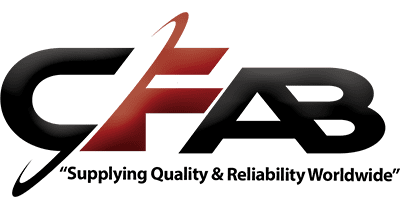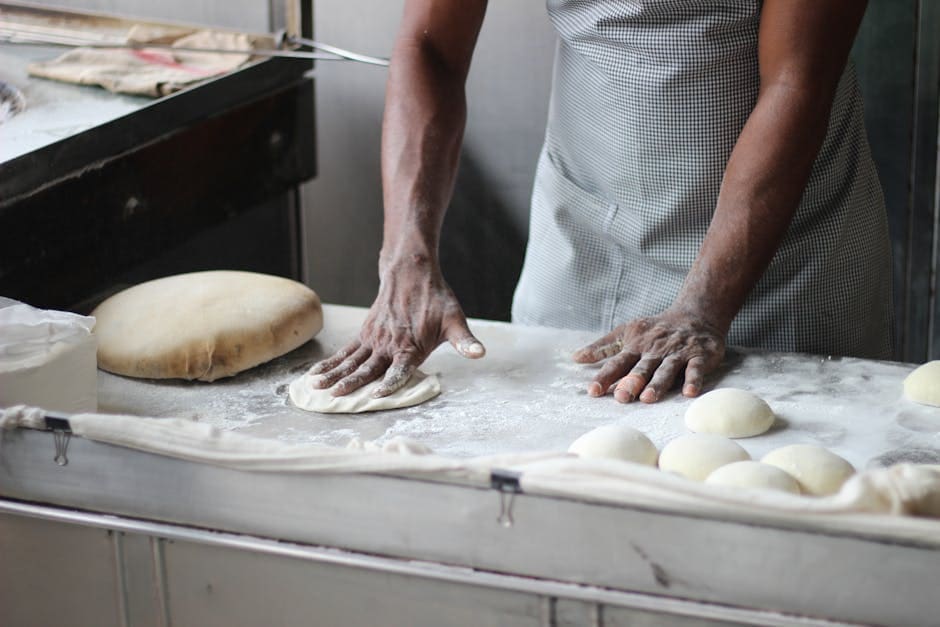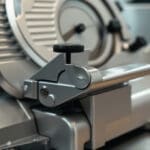If you’re searching for how to improve bakery production and thrive in today’s competitive market, you’re in the right place. Let’s dive straight into it:
- Assess & Optimize the Production Line
- Provide Training & Development Workshops
- Implement Quality Management Systems
- Invest in Reliable Processing Equipment
- Review Ingredient Processes & Suppliers
In the busy world of baking, efficiency is not just a benefit – it’s a necessity. The baked goods industry is highly competitive, with consumer demand constantly on the rise. Commercial bakeries must excel in both quality and quantity to stay ahead. Streamlining operations, using cutting-edge food processing equipment from companies like Beth-El Machinery Ltd., and continuously looking for process improvements are key steps to achieving this.
My name is Todd Cleppe, and with over 25 years of experience in designing and improving food processing equipment, I’ve helped numerous companies boost their bakery production line efficiencies. Understanding exactly how to improve bakery production is my specialty. I bring practical insights from the field to ensure your bakery can meet production, quality, and efficiency goals.

Now, let’s dig into how you can assess and optimize your production line to get started.
Quick how to improve bakery production terms:
– how to improve a product
– how to improve business productivity
– what can a business do to improve its productivity
Assess and Optimize the Production Line
Meeting high demand while maintaining consistent quality can be challenging. To tackle this, it’s important to assess and optimize the production line.
Workflow Assessment
First, examine the workflow. Identify bottlenecks and areas where delays occur. Look at each step of the process, from mixing ingredients to packaging the final product. Ask yourself:
- Where do slowdowns happen?
- Are there redundant steps that can be eliminated?
- Is there a way to rearrange the production line for smoother operations?
A thorough assessment will help you understand where to improve efficiency and boost productivity in your bakery.
Implement Automation
Automation can significantly streamline your process. Industrial mixers, automated packaging systems, and other machinery can save time and reduce errors. Companies like Beth-El Machinery Ltd. offer advanced bakery processing equipment that can help you automate various stages of production.
For example, using an industrial mixer ensures consistent dough quality, while automated packaging systems speed up the packaging process, ensuring each product is sealed and labeled correctly.

Quality Management Systems
Implementing quality management systems is crucial. Regular inspections and tests throughout the production line ensure compliance with industry standards. Automated quality assurance systems can help detect problems early, reducing waste and ensuring high-quality products.
Key components of a quality management system include:
- Regular Inspections: Frequent checks of equipment and processes.
- Automated Quality Assurance: Using technology to monitor quality in real-time.
- Compliance: Ensuring all processes meet regulatory standards.

Streamline Processes
Once you’ve identified bottlenecks and implemented automation, it’s time to streamline processes. This means:
- Reducing Redundancies: Eliminate any unnecessary steps.
- Optimizing Equipment Use: Ensure all machinery is used efficiently.
- Training Staff: Make sure employees are trained to use new equipment and follow new processes.
By continuously monitoring and adjusting the production line, you can maintain high efficiency and product quality.
If you’re looking to take your bakery production to the next level, stay tuned for the next section on investing in reliable processing equipment.
Invest in Reliable Processing Equipment
Benefits of High-Quality Equipment
Investing in advanced machinery can significantly improve bakery production. High-quality equipment like industrial blenders and automatic tempering machines offer numerous benefits.
Consistency
Using reliable processing equipment ensures that every batch of baked goods is consistent. For example, an industrial blender mixes ingredients uniformly, resulting in dough with the same texture and quality every time. This consistency is crucial for maintaining customer satisfaction and brand reputation.
Reduced Production Time
Advanced machinery reduces the time it takes to produce baked goods. Automated systems can handle repetitive tasks faster than human workers. For instance, automatic tempering machines precisely control the temperature of chocolate, speeding up the process and reducing manual labor. This efficiency allows bakeries to meet high demand without compromising quality.
Beth-El Machinery Ltd.
When it comes to reliable food processing solutions, Beth-El Machinery Ltd. offers top-of-the-line equipment. Their machinery is designed to streamline bakery production, ensuring both efficiency and quality. From industrial mixers to automated packaging systems, Beth-El Machinery Ltd. provides comprehensive solutions that can transform your production line.
Key Equipment Types
- Industrial Blenders: Ensure uniform mixing of ingredients.
- Automatic Tempering Machines: Precisely control temperatures for chocolate and other sensitive ingredients.
- Automated Packaging Systems: Speed up packaging while maintaining accuracy and hygiene.
By investing in high-quality equipment, bakeries can achieve greater consistency, reduce production time, and ultimately increase profitability.
Next, we’ll discuss the importance of providing training and development workshops to further improve bakery production.
Provide Training and Development Workshops
Cross-Training Employees
Training is a key part of improving bakery production. Well-trained employees can do their jobs more efficiently and make fewer mistakes. This not only boosts productivity but also makes the workplace safer and more enjoyable.
Standardized Work Processes
Standardized work processes ensure that every employee knows exactly how to perform their tasks. This reduces errors and ensures that every product meets the same high standards. Clear operating procedures can help employees understand the steps involved in each task, making it easier for them to follow best practices.
Clear Operating Procedures
Having clear operating procedures is crucial. These procedures should be easy to understand and accessible to all employees. This helps in maintaining consistency and quality across all production stages.
Versatility Through Cross-Training
Cross-training employees to handle multiple tasks can make your bakery more versatile. For example, employees trained in both baking and customer service can switch roles as needed. This flexibility helps manage varying demand and ensures that all tasks are covered, even when someone is absent.
Retention and Efficiency
Cross-training also improves employee retention. When employees can perform various tasks, they feel more valued and are less likely to leave. This reduces turnover and the costs associated with hiring and training new staff. Plus, versatile employees can fill in where needed, making the whole operation more efficient.
Case Study: Real-World Impact
A study highlighted by Harvard Business Review showed how cross-training employees improved service and job quality in small food companies. Employees became more productive and contributed more, allowing companies to pay them better. This approach can be particularly beneficial in a bakery setting, where demand can vary greatly.
By investing in employee training and cross-training, bakeries can improve efficiency, reduce errors, and improve overall job satisfaction. This leads to a more productive and harmonious workplace.
Next, we’ll explore how to optimize ingredient processes and suppliers to further boost your bakery’s production efficiency. When it comes to food packaging or food processing solutions, consider using Beth-El Machinery Ltd. for reliable and high-quality equipment.
Optimize Ingredient Processes and Suppliers
Quality Control of Raw Ingredients
Optimizing your ingredient processes and suppliers is crucial for maintaining high-quality bakery production. Let’s break down how to do this effectively.
Inventory Management
Efficient inventory management is essential. Use just-in-time techniques to reduce waste and keep ingredients fresh. This approach ensures you have what you need, when you need it, without overstocking.
Building relationships with reliable suppliers is key. Consistent quality and timely deliveries can make or break your production line. Communicate your needs clearly and work with suppliers who can meet your specifications.
Testing and Specifications
Quality control starts with testing your raw ingredients. Establish clear specifications for each ingredient, like protein, ash, and moisture content for flour. Regular testing ensures these specifications are met.
Supplier Communication
Open communication with suppliers is vital. If an ingredient doesn’t meet your standards, let them know immediately. This helps maintain consistency and can lead to improvements in their processes.
Just-in-Time Techniques
Adopting just-in-time techniques can streamline your inventory management. This method minimizes storage costs and reduces waste. By receiving ingredients as you need them, you ensure they are fresh and of high quality.
Case Study: Real-World Impact
Consider a large bakery that implemented a rigorous quality control system. They set strict specifications for their ingredients and communicated these to their suppliers. By doing so, they saw a significant improvement in product consistency and a reduction in waste.
For food packaging or food processing solutions, consider using Beth-El Machinery Ltd. solutions to further enhance your bakery’s efficiency.
Next, we’ll dive into monitoring and adjusting production processes to further improve your bakery’s efficiency.
Monitor and Adjust Production Processes
Benchmarking and Optimization
To improve bakery production, monitor and adjust your processes continuously. This involves focusing on dough quality, the dividing stage, and baking and cooling adjustments. Let’s break it down.
Dough Quality
The quality of your dough can make or break your final product. Consistency in the mixing process is key. Monitor variables like temperature, mixing time, and ingredient ratios. Use objective methods to measure dough characteristics, such as elasticity and hydration levels. This ensures that each batch meets your quality standards.
Dividing Stage
The dividing stage is crucial for maintaining uniformity. If the dough is not divided accurately, it can lead to inconsistencies in size and shape. Implement precise dividing equipment from Beth-El Machinery Ltd. and regularly calibrate it. This minimizes variations and ensures each piece of dough is the same size, leading to uniform baking.
Baking and Cooling Adjustments
Baking is another critical stage. Incorrect oven temperatures can affect the oven spring and overall texture of your baked goods. Monitor oven temperatures closely and make adjustments as needed. Cooling is equally important. Cooling too rapidly can cause structural issues, such as the sidewalls of a loaf collapsing. Aim to reach an optimal internal temperature gradually to maintain product integrity.
Set Benchmarks
Setting benchmarks is essential for process consistency. Use historical data to set realistic and achievable benchmarks. For example, if you know that a specific dough recipe yields the best results at a certain hydration level, make that your benchmark. Regularly compare your current performance against these benchmarks to identify areas for improvement.
Process Consistency
Consistency is key in bakery production. Implement standardized procedures for each stage of production. This ensures that every batch is produced under the same conditions, reducing variability and improving overall quality.
Objective, scientific analysis is crucial for benchmarking and optimization. Traditional methods of assessing baked goods, like taste and texture, are subjective. Instead, use tools like the C-Cell imaging system. This system provides a detailed analysis of crumb texture, crust color, and loaf volume in just five seconds. It measures critical parameters like cell diameter, wall thickness, and number of cells. This data helps you understand the impact of process changes and maintain consistency.
Case Study: Real-World Impact
Consider a bakery that adopted the C-Cell imaging system. They used it to analyze their loaves and set benchmarks for quality. As a result, they saw a 20% improvement in product consistency and a significant reduction in customer complaints. This scientific approach allowed them to fine-tune their processes and achieve better results.
By monitoring and adjusting your production processes, you can ensure high-quality outcomes and meet customer expectations. Next, we’ll explore frequently asked questions about how to improve bakery production.
Frequently Asked Questions about How to Improve Bakery Production
What is the best way to increase baking efficiency?
Increasing baking efficiency involves several strategies:
-
Optimizing the Production Line: Streamline your workflow to identify and eliminate bottlenecks. This can help you produce more in less time.
-
Implementing Automation: Invest in automated machinery, such as industrial mixers and packaging solutions from Beth-El Machinery Ltd. Automation reduces manual labor and minimizes errors.
-
Training and Development: Provide ongoing training for employees to improve their skills and knowledge. Cross-training can also make your workforce more flexible and efficient.
-
Quality Management Systems: Regular inspections and automated quality assurance ensure that your products meet high standards consistently.
-
Reviewing Ingredient Processes and Suppliers: Efficient inventory management and reliable suppliers can reduce waste and ensure a steady supply of high-quality ingredients.
What is quality control in the bakery industry?
Quality control ensures that baked goods meet specific standards and customer expectations. This involves:
- Regular Inspections: Frequent checks throughout the production process to identify and correct issues.
- Testing Equipment: Regular calibration and maintenance of machinery to ensure consistent performance.
- Automated Quality Assurance: Using technology to monitor and maintain quality standards.
- Inventory Management: Keeping track of raw materials to ensure they meet quality specifications.
- Conducting Audits and Reports: Regularly reviewing processes and outcomes to identify areas for improvement.
What are the different types of production in the bakery industry?
The bakery industry uses various production methods to meet different needs:
- Batch Production: Producing smaller quantities of baked goods in separate batches. This method is flexible and allows for customization but may be less efficient for large-scale production.
- Continuous Production: A non-stop production process that is ideal for high-demand items. It maximizes efficiency but requires significant investment in machinery and space.
- Mass Production: Producing large quantities to meet high demand. This method benefits from economies of scale but may sacrifice some flexibility.
Continuous Improvement: Regardless of the method, continuous improvement is crucial. Regularly evaluate and adjust your processes to stay efficient and competitive.
By understanding and implementing these strategies, you can significantly improve bakery production and meet evolving customer demands.
Conclusion
Continuous improvement is the backbone of any successful bakery operation. By regularly evaluating and adjusting your processes, you can ensure long-term operational efficiency and stay competitive in the changing baked goods industry.
At CFAB Global, we are committed to helping you achieve this goal. Our unique Machine Reliability Program offers customized analysis, services, equipment, and support to increase productivity, reduce downtime, and extend the lifespan of your machinery components.
Our dedication to quality doesn’t stop at machinery. We believe in building lasting relationships with our clients, understanding your unique challenges and objectives, and providing solutions custom to your specific needs.
By focusing on continuous improvement and maintaining high-quality standards, you can ensure the long-term success of your bakery. Small changes can lead to significant impacts, making your operations more efficient and your products more consistent.
Commitment to Quality: Whether it’s investing in advanced machinery from Beth-El Machinery Ltd, implementing robust quality management systems, or optimizing ingredient processes, our commitment to quality is unwavering.
In the competitive world of bakery production, continuous improvement and a commitment to excellence are not just options—they are necessities for long-term success.
If you’re looking to improve your bakery production, contact us at CFAB Global. We’re here to help you every step of the way.






